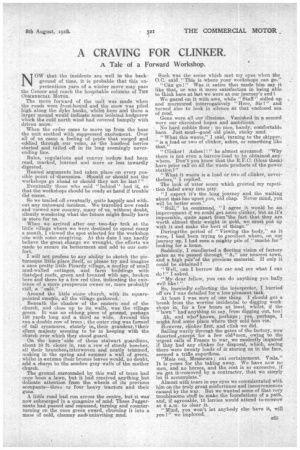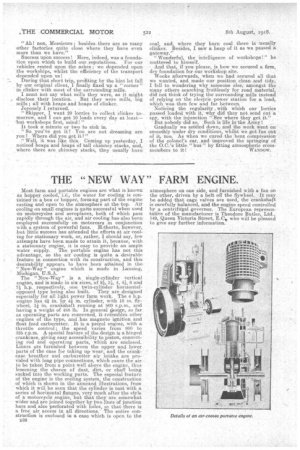A CRAVING FOR CLINKER.
Page 15

Page 16

If you've noticed an error in this article please click here to report it so we can fix it.
A Tale of a Forward Workshop.
NOW that the incidents are well in the background of time, it is probable that this unpretentious yarn of a winter move may pass the Censor and reach the hospitable columns of THE 0011XERCIAL MOTOR.
The move forward of the unit was made when the roads were frost-bound and the snow was piled high along the dyke banks, whilst here and there a larger mound would indicate some isolated hedgerow which the cold north wind had covered bumpily with driven snow.
When the order came to move up from the base the unit seethed with suppressed excitement. Over all of us came a feeling of pride that surged and eddied through our veins, as the hundredlorries started and tailed off in its long seemingly neverending line.
Rules, regulations and convoy :ordeus had been read, marked, learned and more or less inwardly digested.
Heated arguments had taken place on every possible point of -diacussion. Should or should not the workshops go ahead or should they not be last?"
Eventually those who said "behind" had it, so that the workshops should be ready at hand if trouble did ensue.
So we trailed off eventually, quite happily and without any untoward incident. We travelled new roads and viewed neW country, many of us, without doubt, silently wondering what the future might finally have in store for us.
When we arrived after our two-day trek at the little village where we were destined to spend many a month, I viewed the spot selected for the workshop site with some misgiving. At this date I can hardly believe the great change we wrought, the efforts we made to secure its betterment and add to our comfort.
I will not profess to any ability to sketch the picturesque little place itself, so please try and imagane a once pretty little Picardy village, a medley of small mud-walled cottages, and farm buildings with thatelled roofs, green and bronzed with age, broken here and there by a few red tiles, indicating the existence of a more prosperous owner or, more probably still, a "cafe.".
Around the little stone church, with its squarepointed steeple, all the village gathered. , Beneath the shadow of the eastern end of the church, and close up to its walls, was the village green. It was an oblong piece of ground, perhaps 150 yards long and a third as wide. Around this ran a, double row Of trees ; the outer ring was formed of tall sycamores, stately in, their grandeur, S their silent majesty seeming to be in keeping with the church over which they stood guard.
On the inner side of these stalwart guardians, about 10 ft. closer in, ran a row of sturdy beeches,. all their branchesiinterwoven and neatly trimmed, making in the spring and summer a wall of green, whilst in autumn their bronze leaves would, no doubt, add a charm to the sombre grey walls of the mother church.
The ground surrounded by this wall of trees had once been a lawn, but it had received anything but delicate attention from the wheels of its previous eccupants—three or four heavy tractors and their guns.
A little road had run across the centre, but it was now submerged in a quagmire of mild. These ,Tuggernauts had passed and repassed, turning and counterturning on the once green sward, churning it into a mass of cold, clammy andi uninviting mud. Such was the scene which met my eyes when the 0.0. said "This is where your workshops can go."
"Can go! " Was it satire Oat made him say it • like that or was it mere satisfaction in being able to think here at last we were at our journey's end?
We gazed on it with awe, while " Staff " sidled up and murmured interrogatively "Here, Sir?" and turned also to look in silence at that enclosed sea
of mud.
Gone were all our illusions. Vanished in a second were our cherished hopes and ambitions.
No hard cobble floor ; no nice, handy, comfortable barn. Just mud—good old Plain, sticky rand.
"What this wants," I said, turning to the skipper, "is a load or two of clinker, ashes, or something like that."
"Clinker I Ashes I !" he almost screamed. "Why there is not even a barrow-load to be obtained anywhere. Don't you know that the R.F.C. (bless them) have prior call on all the waste products of the power
station?"
"What it wants is a load or two of clinker, never theless," I replied.
The look of utter scorn which greeted my repeti
tion faded away into pity.
"I expect it's the long journey and the waiting about that has upset you, old chap. Never mind, you
will be better soon."
"Still," he continued, "I agree it would be an improvement if we could get some clinker, but as it's impossible, quite apart from 'the fact that they are worth almost their weight in gold, we must put up with it and make the best of things."
Duringtthe period of "Viewing the body," as it were, I had been trying to q-ecollect where, on our journey up, I had seen a mighty pile of " mache for"
looking for a home.
Suddenly, I recollected a. fleeting vision of factory gates as we passed through "A," our nearest town,
and a high pile'of the precious material. If only it could be obtained?
"Well, can I borrow the car and see what I can
do?" I asked.
"My dear fellow, you can do anything you hay well like ! "
So, hurriedly collecting the interpreter, I hurried off 'ere I was detailed for a less pleasant task.
At least I was sure of one thing. I should get a break from the worries incidental to digging workshops in, for a few hours at least, whilst, if the " lawn " had anything to say, from digging out, too ! Ah, and wiao4' knows, perhaps ; yes, perhaps, I might.find some Place where they sold bon vin.
However, clinker first, and clink we did.
Sailing warily through the gates of the factory, now
deserted.,except for a few oldAmen, owing to the urgent calls of France to war we modestly inquired if they had any clinker for aisposal, which, seeing there were twenty loads of it staring us in the face, seemed a trifle 8wpm-firms. "Mais oui, Messieurs ; oui certainement.
It is yours for the taking away. We have now no men, and no horses, and the cost is so excessive, if we get iteremoved by a contractor, that we simply
let it accumulate."
Almost with tears in our eyes we commiserated with him on the truly great misfortunes and inconveniences caused by the war. But we wanted some of that very troublesome stuff to make the foundations of a path, and, if agreeable, 16 lorries would attend to-morrow at 9 a.m. to clear it. "Mind, you won't let anybody else have it, will you?" we implored.
" Ah! non, Messieurs ; besides . there are so many other factories quite close where they have even more than we have." Success upon success ! Here, indeed, was a foundation upon which to build our reputations. For our vehicles rested upon the ashes ; we depended upon the workships, whilst the efficiency of the transport depended upon us !
During that short trip, profiting by the hint let fall by our original client, I finally fixed up a " corner" in clinker with most -of the surroimding mills.
I must not say what mills they were, as it might. disclose •their location. But they were mills, big mills ; all with heaps and heaps of clinker. •
Joyously I returned. . . . . .
" Skipper, I want 20 lorries to collect clinker to-, Morrow, and I can get 10 loads every day at least— but workshops first, mind! "
It took a minute or two to sink in. .
"So .you've got it?..• You are not dreaming are you? • _Where did you get it?" "Well, it .was; like this, • Coming up yesterday, I noticed heaps and heaps Of 'tall chimney stacks, and, where there are chimney stacks; they usually burn coal, and, where they burn coal there is usually clinker. Besides, I saw a heap of it as We passed a gateway."
"Wonderful, the intelligence of workshops!" he muttered to himself.
And that, if you•please, is how we secured a Earn, dry foundation for our workshop site.
Weeks afterwards when we had secured all that we wanted, and made our position clean and tidy, I fell to wondering why someone else, amongst the many others searching fruitlessly for, road material, did' not think of trying the surrounding mills instead of relying on the electric .power station for. a load; which was. then few and far between.
Noticing the regularity . with whiah our lorries Passed loaded with it, why did they net send out a spy, with the injunction "See where they get it." .
But nobedy.clid so.. Such -is -life in -the Arthy !
Gradually we settled down, and the ...work went on smoothly wider dry Conditions, whilst we got fun out Of it, too. As when we cured the .bent compression of the colonel's Car, and -improved the springing of the 0.0's little "bus" by fitting atmospheric cross members to it! WANDOW.






















